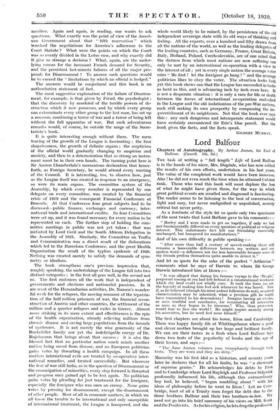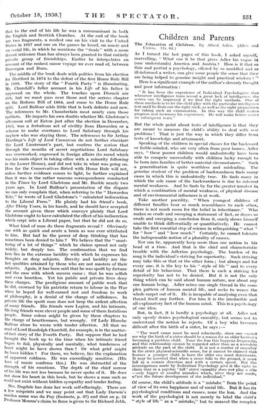Lord Balfour
Chapters of Autobiography. By Arthur James, 1st Earl of Balfour. (Cassell. 10s. 6d.) THE task of writing a " full length " Life of Lord Balfour is in the hands of his niece, Mrs. Dugdale, who has now edited the results of his own efforts, undertaken in his last years. The value of the completed work would have been immense. Alas ! he did not even reach the time when he attained Cabinet rank. Those who read this book will most deplore the loss of what he might have given them, for the way in which great political events are recalled and diagnosed is fascinating. The reader seems to be listening to the best of conversation, light and easy, but never undignified or unpolished, acutely critical but never petty.
As a foretaste of the style let us quote only two specimens of the neat twists that Lord Balfour gave to his comments
:- Morley and I were made to get on together, if only we had not fundamentally differed on every question of political or religious interest. This unfortunate fact loft our friendship essentially unchanged, but hampered its manifestations."
And of his own difficulty in public speaking :—
" After more than half a century of speech-making there still remains a lamentable difference between my written and my spoken word—a difference not the less lamentable because some of my friends profess themselves quite unable to detect it."
And let us quote for the sake of the perfect " Arthurian " comments what he says of Darwin to whom Sir George Darwin introduced him at Down It was alleged that during his famous voyage in the 'Beagle,' perpetual tossing at sea had left behind it a constitutional weakness which dry land could not wholly cure. It took the form (so ran the legend) of making him feel sick whenever ho was bored. Now if, as he believed (though his most ardent followers do not), acquired characteristics may be inherited, what a precious gift he might have transmitted to his descendents ! Imagine having an excuse, at once truthful and conclusive, for terminating all interviews as soon as they began to he tiresome ! Who, thus protected, would fear to face the world ! He might inspire anxiety among his associates, but he need feel none himself."
The first chapters are about his home, Eton and Cambridge. There was happy family life at Whittingehame where a good and clever mother brought up her large and brilliant family. We can see their tastes in a flash when Lord Balfour lays down two tests of the popularity of books and the age of their lovers, and says
The Jane Austen volumes pass triumphantly through both tests. They are worn and they are dirty."
Macaulay was his first idol as a historian, and seventy years later he declares that for all his faults, he was a showman of supreme genius." He acknowledges his debts to Eton and to Cambridge where Lord Rayleigh and Professor Sidguick profoundly influenced his life, although this extraordinary boy had, he believed, " begun muddling about " with his ideas of philosophy before he went to Eton ! Let no Cane bridge, least of all a Trinity man forget the debt due to the three brothers Balfour and their two brothers-in-law. We need not go into his brief summary of his views on Mill, Kant and the Positivists. As for his religion, he lets drop the profession that to the end of his life he was a communicant in both the English and Scottish Churches. At the end of the book are two fragments, a modest one on his visit to the United States in 1917 and one on the games he loved, on music and on social life, in which he mentions the "Souls" with a more decent reticence than has always been granted to that entirely private group of friendships. Earlier he interpolates an account of the rashest canoe voyage we ever read of, between Dunvegan and Rum.
The middle of the book deals with politics from his election for Hertford in 1874 to the defeat of the first Home Rule Bill in 1886. The story of the " Fourth Party " is illuminating. Mr. Churchill's fuller account in his Life of his father is approved on the whole. The touches upon Disraeli are rich, but we must pass over those and the serious chapter on the Reform Bill of 1884, and come to the Home Rule split. Lord Balfour adds little that is both definite and new. The references to Mr. Chamberlain most nearly earn those epithets. He imparts his own doubts whether Mr. Gladstone's afternoon call at Eaton just after the election in December, 1881, was a fortuitous act of civility from Hawarden or a scheme to make overtures to Lord Salisbury through his nephew who was staying there. The references to Sir Arthur Hardinge's Life of Lord Carnarvon do not further elucidate the Lord Lieutenant's part, but confirm the notion that through the months of secret negotiations Lord Salisbury was overworked, engrossed in foreign affairs (to mend which was his main object in taking office with a minority following in the Lower House), and did not take in what was going on. How far the Conservatives flirted with Home Rule will not, unless further evidence comes to light, be further explained than it was in the rather raucous correspondence conducted in the Times by Lord Gladstone and Mr. Buckle nearly two years ago. In Lord Balfour's presentation of the dispute we can only complain that, when referring to the " Hawarden Kite," he wrote of Lord Gladstone's " calculated indiscretion to the Liberal Press." He plainly had his friend's book, After Thirty Years, in his hands, and he should have accepted the account given there which conveys plainly that Lord Gladstone ought to have calculated the effect of his indiscretion which crept into a Liberal paper, but that he did not do so. What kind of man do these fragments reveal ? Obviously one with as quick and acute a brain as was ever attributed to him. But had he the power of deep thinking that has sometimes been denied to him ? We believe that the " smat- tering of a lot of things " which he claims spread not only widely, but deeply too. The confirmation that we find here lies in the extreme lucidity with which he expresses his thoughts on deep subjects. Brevity and lucidity are the last qualities attained by those who are not masters of their subjects. Again, it has been said that he was spoilt by fortune and the case with which success came ; that he was selfish and even heartless. Yet his public and private lives deny these charges. The prodigious amount of public work that he did, crowned by his patriotic return to labour in the War when he hoped for well-earned rest and freedom to work at philosophy, is a denial of the charge of selfishness. In private life the spoilt man does not keep the ardent affection of many friends. His friends were Legion, and his intimate, life-long friends were clever people and some of them fastidious people. Some colour might be given by these chapters to the charge of heartlessness, but wrongly. Of Lady Blanche Balfour alone he wrote with tender affection. All that we read of Lord Randolph Churchill, for example, is in the matter- of-fact story of the Fourth Party. But suppose that he had brought the book up to the time when his intimate friend began to fail, physically and mentally, what tenderness of heart might he have shown then ? Or what grief might he have hidden ? For there, we believe, lies the explanation of apparent coldness. He was exceedingly sensitive. (His love of music confirms this.) He was distrustful of the strength of his emotions. The depth of the chief sorrow of his life was not less because he never spoke of it. He does not show his heart in this book, but he shows a man such as could not exist without hidden sympathy and tender feeling. Mrs. Dugdale has done her work self-effacingly. There arc a few Misprints and we may point out that Lady Darwin's maiden name was du Puy (footnote, p. 37) and that on p. 53 Professor Monroe's claim to fame is given to Sir Richard Jebb.

























































 Previous page
Previous page